Discover how Islamic medicine revolutionized healthcare with groundbreaking practices and innovations that have shaped modern medical standards.
From pioneering hospital organization to preserving Greek medical knowledge, delve into the profound contributions of figures like Al-Razi and Ibn Sina.
Impact on Western Medicine
The integration of Islamic medical knowledge into Western medicine profoundly transformed fields such as anatomy, surgery, and pharmacology. You can trace this transformation back to the translation efforts in Baghdad, where Greek medical texts were translated into Arabic.
These texts, enriched with Islamic medical insights, were later translated into Latin, making their way into European universities. This process allowed Western doctors to access a vast repository of medical knowledge.
Muslim physicians, such as Al-Razi, Ibn Sina, and Al-Zahrawi, made groundbreaking contributions that reshaped Western medical education and practice. Their works, like Al-Razi's extensive medical encyclopedia and Ibn Sina's 'The Canon of Medicine,' provided detailed anatomical descriptions and surgical techniques that were previously unknown or underdeveloped in the Western world.
Islamic medical concepts also introduced advanced hygiene practices, hospital organization, and systematic medical record-keeping, which were adopted into Western care frameworks. The organized structure of hospitals in cities like Cairo and Baghdad set a new standard for patient care and medical efficiency.
Thus, the profound impact of Islamic medicine on Western practices underscores the importance of these translated works and the pioneering efforts of Muslim physicians in shaping modern healthcare.
Advances by Arab Scholars
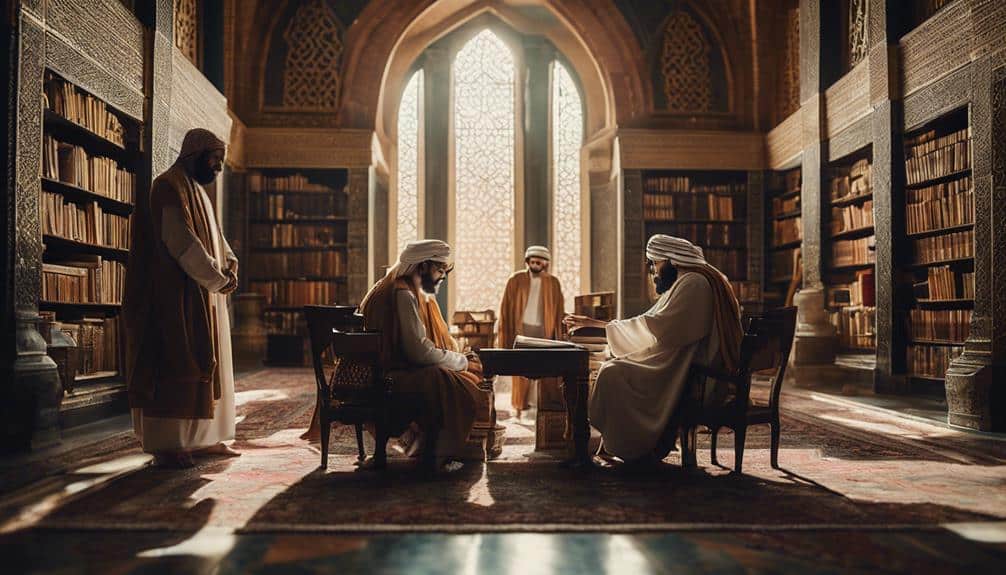
You'll find that Arab scholars weren't just pioneers in medicine but also in mathematics and astronomy.
They introduced advanced algebraic concepts and refined astronomical instruments, which were essential for both navigational and medical advancements.
Mathematical Innovations by Arabs
Often overlooked, Arab scholars made groundbreaking contributions to mathematics that have profoundly shaped modern science and technology. These scholars pioneered the field of algebra, a term derived from the Arabic word 'al-jabr.' They introduced the crucial concept of algorithms, which are fundamental to computer science today.
Arabic numerals, including the revolutionary concept of zero, were also brought to the Western world by Arab mathematicians. This numerical system facilitated more straightforward calculations and record-keeping, becoming the cornerstone of modern arithmetic. Al-Khwarizmi, one of the most influential Arab mathematicians, advanced trigonometry and greatly improved methods for astronomical calculations, enhancing navigation and timekeeping.
The decimal system, another pivotal innovation, originated from these scholars during the Islamic Golden Age. This system simplified mathematical operations and is still in use today.
Additionally, Arab scholars translated and preserved Greek mathematical works, ensuring the continuity and expansion of mathematical knowledge.
Advances in Astronomy
Building on their mathematical innovations, Arab scholars also revolutionized astronomy with groundbreaking instruments and precise celestial observations. They developed astrolabes, which became vital for navigation and timekeeping. These tools allowed for accurate star charts and improved the comprehension of celestial mechanics.
Notable figures like Al-Battani and Al-Zarqali made substantial contributions. Al-Battani refined the calculations of the solar year and the orbits of planets, while Al-Zarqali's work on the Toledan Tables provided essential data for celestial observation. Their work built on Greek and Indian astronomy, translating and expanding this knowledge within a rich Islamic scholarly tradition.
The House of Wisdom in Baghdad was a central hub for astronomical research. It fostered advancements in trigonometry, which were pivotal for precise celestial mechanics. Here, scholars systematically observed the skies, leading to a more precise understanding of the universe.
These contributions by Arab scholars laid the groundwork for later European developments in astronomy. Their meticulous observations and innovative instruments significantly propelled the field, demonstrating how interconnected knowledge from different cultures can drive scientific progress. Understanding these advancements provides a clearer picture of the foundations of modern astronomy.
Contributions of Arab Physicians
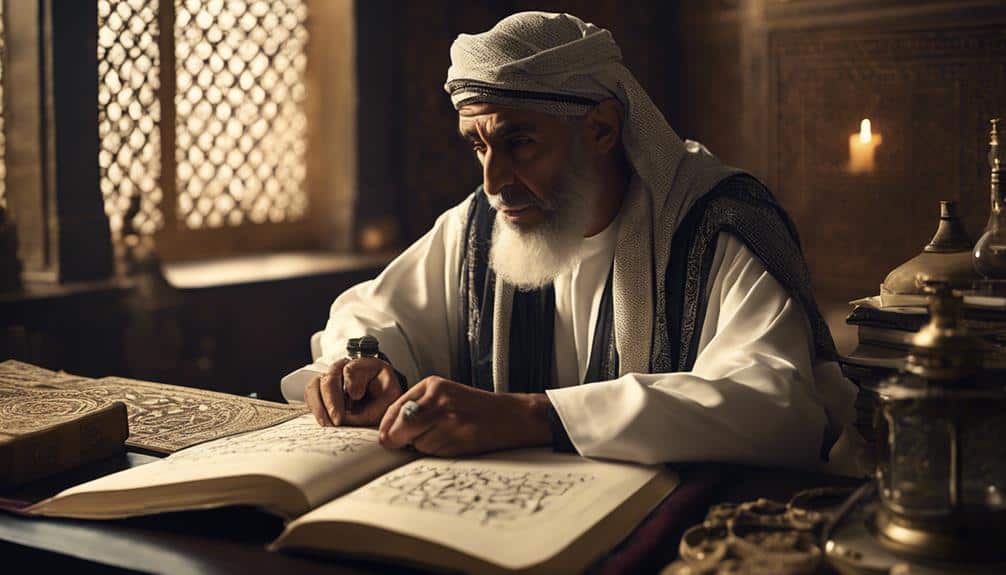
Arab physicians, like Al-Razi and Ibn Sina, deeply impacted the evolution of medical practice in Europe during the Islamic Golden Age through their pioneering research and methodologies. Al-Razi, recognized for his extensive texts and clinical observations, significantly pushed forward medical education and practice. His works, including 'Al-Hawi,' were crucial in shaping future medical curricula.
Ibn Sina, or Avicenna, penned 'The Canon of Medicine,' a seminal medical text that remained a cornerstone in European medical education for centuries. His systematic approach to medicine, covering diagnosis, treatment, and pharmacology, established new standards in the field.
Ibn Al-Nafis made a groundbreaking discovery by describing pulmonary circulation centuries before William Harvey, showcasing the sophistication of Islamic medicine. Al-Zahrawi, often known as the father of modern surgery, compiled 'Tasrif,' an exhaustive medical text that became a vital resource in European universities.
Arab physicians not only documented their findings but also applied modern medical concepts such as separate wards, hygiene practices, and medical records in their hospitals. These innovations highlight their dedication to enhancing patient care and set the foundation for many practices we witness in modern medicine.
Decline and Knowledge Transfer
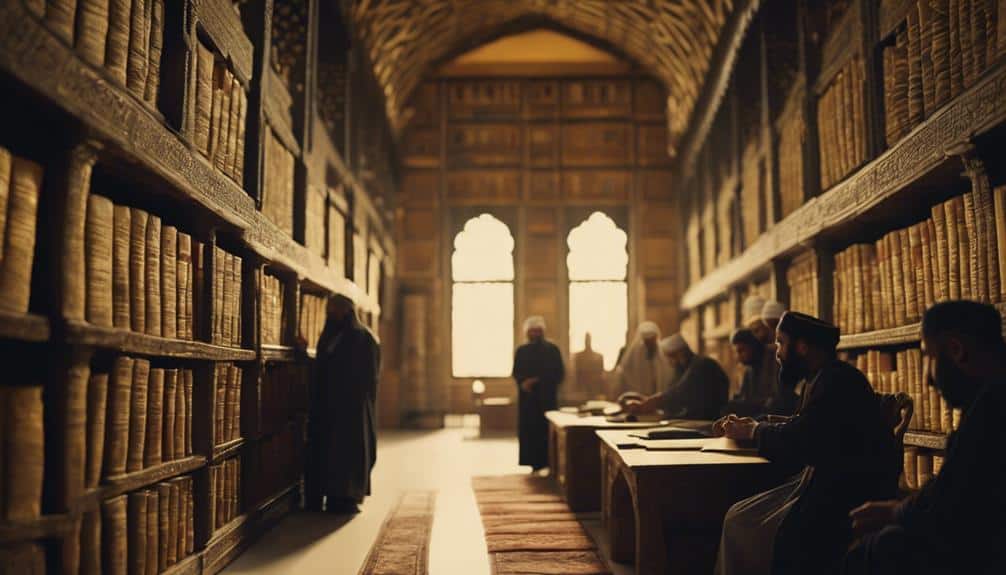
You'll notice that the rise of new powers like the Mongols and Ottoman Turks had a significant impact on the decline of Islamic civilization. Internal conflicts and the conquest of Islamic cities by Christian armies in Spain further disrupted the flow of scientific and medical advancements.
Rise of New Powers
As new powers like the Mongols and Ottoman Turks emerged, they played a vital role in the decline of Islamic civilization and the subsequent shift in the transfer of knowledge to the West. The Islamic world faced significant internal strife and civil conflict, weakening its major cities and making them vulnerable to conquest.
The Mongols' invasions in the 13th century wreaked havoc, leading to the destruction of key centers of learning and culture. Simultaneously, the Ottoman Turks began expanding their empire, further disrupting the political landscape. This period of instability contributed to the decline of Islamic influence.
In Spain, Christian armies gradually conquered Islamic territories, culminating in the fall of Granada in 1492. This marked the end of Islamic rule in the region and a significant power shift. As the Islamic world declined, the flow of technology and ideas that had once enriched European knowledge began to slow and eventually reverse.
The West started to absorb and build upon the scientific and medical advancements previously developed under Islamic rule. This shift in technology transfer played a vital role in shaping the Renaissance and the subsequent progress in Western science and medicine.
Conquest and Conflict
Although the rise of new powers like the Mongols and Ottoman Turks hastened the decline of Islamic civilization, it's essential to understand how internal strife and external conquest disrupted the transfer of knowledge and technology to the West. The Abbasid Caliphate and the Umayyad Dynasty, once beacons of Islamic tradition and innovation, faced debilitating conflicts and invasions. The Mongol conquest of Baghdad in 1258 decimated libraries and scholars, causing an irreversible loss of knowledge.
- Internal strife weakened key Islamic cities, hindering scientific and medical advancements.
- Christian armies' conquests in Spain isolated Islamic states, obstructing the flow of ideas.
- The fall of Granada in 1492 marked a crucial point in the decline of Islamic influence.
- The Ottoman Turks' focus on military expansion over scientific pursuits impeded knowledge transfer.
The combination of internal dissent and external pressures led to the gradual decline of the Islamic world's intellectual dominance.
In Spain, the capture of Islamic cities by Christian forces had a profound impact, culminating in Granada's surrender. This not only marked the end of Islamic political power in the region but also impeded the transfer of knowledge to the West, affecting medical and technological advancements.
Lasting Legacy

How did Islamic civilization's medical advancements leave an indelible mark on the scientific and cultural landscape of Europe?
By preserving and expanding upon Greek medicine, Islamic medical scholars like Ibn Sina played a pivotal role. His seminal work, the Canon of Medicine, synthesized and advanced medical knowledge, becoming a cornerstone text in both the Islamic world and medieval Europe.
Through meticulous documentation of medical practices and advances in surgery, Muslim physicians offered a thorough medical framework that Europe would later adopt and build upon.
Islamic medicine didn't just stop at theoretical contributions; it also included practical innovations. Advances in surgery, such as the development of new techniques and instruments, were significant. This practical knowledge was transmitted to Europe through translations of Islamic texts and interactions during the Crusades and through trade routes.
Islamic culture fostered an environment where medical knowledge could flourish, and this legacy was instrumental in shaping the Western medical tradition.
The preservation and dissemination of knowledge by Arab scholars were essential in transferring these advancements to the West. Today, the relevance of Islamic contributions to medicine and science is still evident, underscoring the profound impact Islamic civilization had on the development of global medical knowledge.
Key Medical Figures
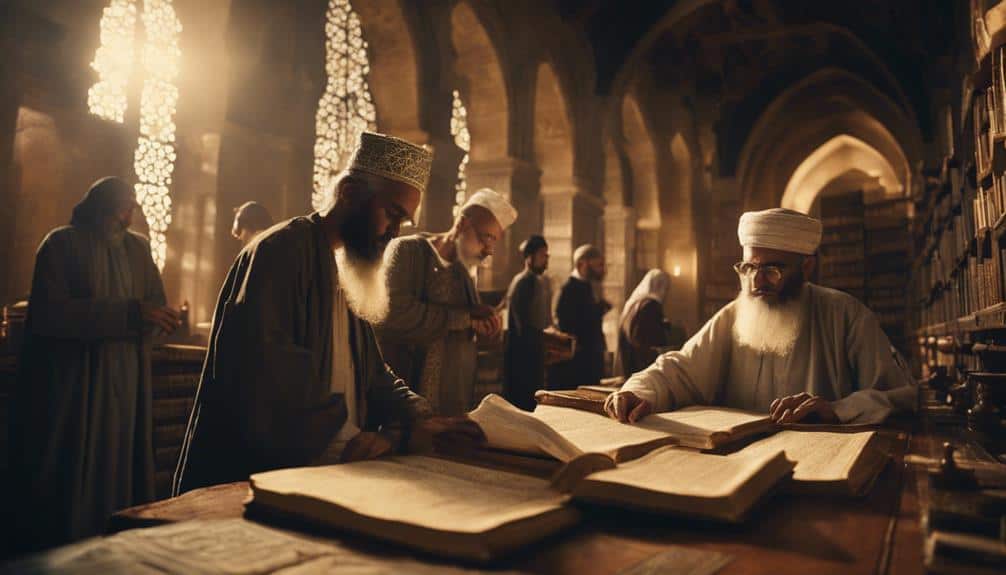
Prominent figures like Al-Razi, Ibn Sina, and Hasan ibn al-Haytham played pivotal roles in advancing medieval Islamic medicine through their groundbreaking research and detailed medical texts. Al-Razi, also known as Rhazes, is renowned for distinguishing diseases and identifying chemical compounds, providing a cornerstone for the evolution of medical science.
Ibn Sina, also known as Avicenna, authored the Canon of Medicine, an extensive work that became a foundational medical text in both the Islamic world and Europe.
Ibn al-Haytham made significant contributions to ophthalmology, offering detailed descriptions of eye anatomy that enhanced understanding and treatment of vision disorders. Ahmad ibn Abi al-Ashath's studies on stomach contractions provided critical insights into digestive health. Additionally, Al-Baghdadi's observations on the jaw structure further enriched the knowledge base of facial anatomy.
- Al-Razi (Rhazes): Distinguished diseases and identified chemical compounds.
- Ibn Sina (Avicenna): Authored the Canon of Medicine, a fundamental medical text.
- Ibn al-Haytham: Advanced ophthalmology with detailed descriptions of eye anatomy.
- Ahmad ibn Abi al-Ashath: Conducted critical studies on digestive health.
These figures' contributions laid the groundwork for many modern medical practices and underscore the rich legacy of Islamic medicine in the history of healthcare.
Enduring Medical Practices
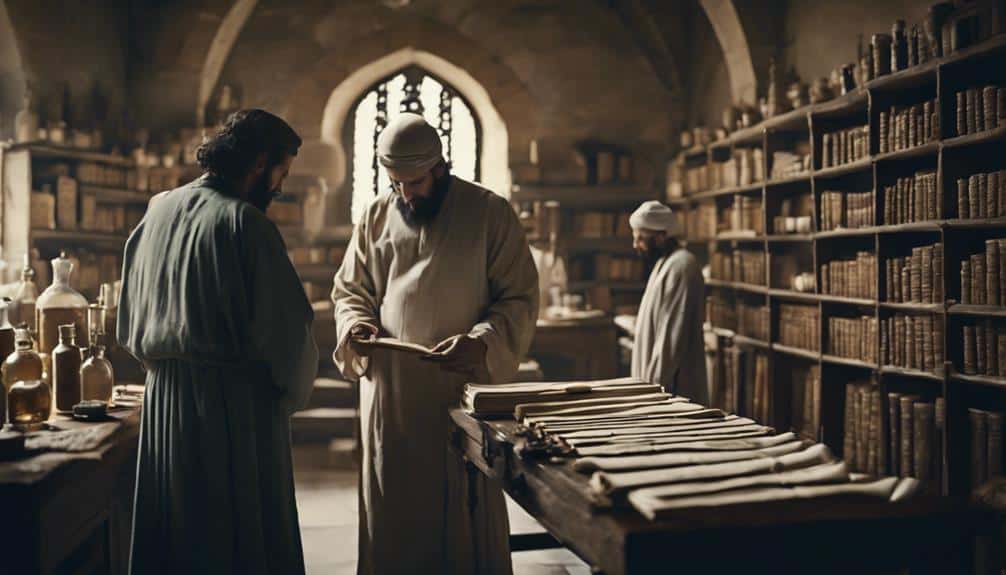
Islamic medicine's emphasis on preventive healthcare, such as cleanliness and dietary regulations, laid the foundation for lasting medical practices that continue to influence modern healthcare systems. By integrating these principles into everyday life, Islamic medicine promoted holistic patient care, which considers the patient's physical, emotional, and spiritual well-being.
Arab and Muslim scholars notably advanced the understanding of human anatomy and physiology. They meticulously documented their findings in ancient medical texts, many of which have been preserved and studied over centuries. These texts serve as a cornerstone for contemporary medical practices and education in countries like Pakistan and Egypt.
The integration of medical education within the cultural institutions, such as mosques and hospitals, ensured that knowledge was disseminated widely and effectively. This holistic approach to patient care included not just treatments but also preventive measures, emphasizing the importance of hygiene and balanced nutrition.
The enduring impact of Islamic medicine is evident in the way modern healthcare systems incorporate these ancient practices. Cleanliness protocols in hospitals and dietary guidelines for patients are direct descendants of these medieval innovations. By valuing both prevention and treatment, Islamic medicine set a precedent that continues to shape healthcare today.


